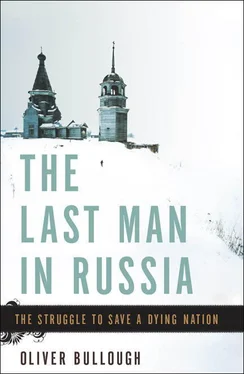This peculiar ritualized battle has been all but forgotten in Russia today. If you have not read the history of the dissident movement, and do not understand the complex relationship between the officials’ equal but opposite desires to punish the prisoners while avoiding publicity, it makes no sense at all. Spodin, however, as he guided us around Perm-36, spoke of the prisoners like the heroes they were.
‘Everything was done to break their spirits, to demean them, but they resisted.’
Further down the track was the Special Regime camp, which made the ordinary Tough Regime barracks seem luxurious. Here the cells were gloomy, their windows fitted with downward-slanting slats so prisoners would never see outside. The cell walls were plastered with uneven concrete – called ‘fur’ in prison slang – to make them ugly and uncomfortable to lean against. The exercise yard is a square of three paces by three paces. Its walls are three metres high, and topped with a mesh of barbed wire, meaning inmates here would never see anything but sky and walls.
‘When I was a teenager, I thought this was a warehouse,’ said Spodin. ‘There were never any people, it was so quiet, it was only later I realized it was a camp. Our parents used to say people were locked up because of the war. They never told us these were political prisoners or anything.’
As we walked out of the barracks and back into the open air, Spodin described his own family’s experiences of repression. His father’s parents came from Ukraine and were sent to the Urals in 1934 during the collectivization campaign. Some of his father’s siblings remained behind, and he had aunts and cousins in Ukraine whom he had never met. His family was lucky, however: at least the children had been able to remain with family members.
‘The state often isolated the parents and raised the children itself. The state wanted to create a culture of informers,’ he said.
His confession unlocked something in the other members of the tour, and people began to volunteer details about their own past.
‘My grandmother was also repressed,’ said a burly man in a blue T-shirt.
‘My family was from Ukraine too, but was sent here,’ said a woman in a red dress.
This is the kind of experience the museum directors want to provide for everyone. They want to make ordinary people realize that the country’s history is their history too, and that it stretches forward to today. As we walked out, we saw a group of nine officers from the OMON, Russia’s riot police, all in uniform. They were beginning a tour of their own. These are the government’s enforcers, and their image is of mindless, brainwashed thugs. Yet here they were, standing patiently while a young woman explained the repressive system of the Soviet state.
‘Those are the kind of comrades who really need this place,’ said the burly man in the blue T-shirt, with an emphasis on the word ‘comrades’. Everyone laughed.
The director of the museum is Viktor Shmurov, a heavyset man with a salt-and-pepper beard. He is a historian and was the first person to spot the unique possibilities of the Perm-36 site. Since it dates back to the Stalin years, it has the wooden barracks and facilities of the original gulag camps, which is why he was so keen to preserve it.
He and his friends, short of cash and building materials, even managed to get the camp’s old sawmilling equipment working. They ran a timber business in the early 1990s, ploughing the profits back into the camp. The Russian word for a saw bench – pilorama – gives its name to the yearly festival.
‘This has been a gradual process. We were building the museum for a long time, and it was hard. We wanted to present it in a positive way,’ he said. In 2005, on the tenth anniversary of the museum’s opening, they organized a concert.
‘I don’t like speeches, congratulations, things like that, but we invited a lot of bards and poets to perform. They went on to the stage, it was a beautiful concert and that is how Pilorama started.’
Two years later, they brought in political experts and activists to hold discussions and the shape of the festival was created: music, film and free conversation, all on a site where previously none of these things had been possible.
‘Here are thousands of free people who behave absolutely as free people,’ he said. ‘If Pilorama is ever cancelled, it will show things have got very bad here, something will be rotten in Denmark. But I have no doubt that we will continue.’
One festival does not equal political freedom, but it is a start. If the winter of protests does lead to Russia’s sclerotic politics becoming a little livelier, it could have an important impact on Russia’s population crisis. Estonia had similar health problems to Russia (though not quite as bad) when part of the Soviet Union. After independence, the life expectancy of the average Estonian man initially sank, but then soared to all-time highs. You can see a similar pattern in other communist countries that have joined the European Union: Romania, Hungary, Slovakia. Prosperity and democracy does seem to be a good way to wean a population off massive alcohol abuse.
The Pilorama discussion sessions inevitably focused on the winter election season, with highly technical statistical presentations showing how fraud had been committed, and what ordinary citizens could do to stop it. The mobilization of thousands of Muscovites to observe the polls had forced electoral officials to behave more honestly, the experts explained, proving it with graphs and photographs. In the December election, the results from Moscow followed no conceivable statistical logic. It was clear officials had falsified the returns. By March, however, the curve was almost identical to that seen in a Western European election. Officials had been forced to record accurate results. It was a heady demonstration of the power of free citizens to affect their own destiny.
Every one of the sixty chairs was full, and another thirty or forty people were standing at the back.
It is a mark of the importance of the event that a group of young people from a Kremlin-linked youth group attempted to sabotage the discussions, asking aggressive questions and accusing the speakers of serving foreign interests. Sergei Kovalyov, a human rights veteran who served time in Perm-36 in the 1980s, fielded the remarks with admirable restraint, considering one of the young men was wearing a hammer and sickle T-shirt. I could not help wondering what would happen if a man of a similar age wore a swastika into Auschwitz.
‘It would be very good if we had decommunistication, like they have had denazification,’ said Kovalyov after he had finally extricated himself from the discussion. ‘You see the support that there still is for the Soviet Union, and among people that were not even born at its height. They were all born after the death of Stalin, and even after Khrushchev. The oldest among them is probably only forty. There are some people among them you can talk to, but their emotions keep getting in the way.’
He was on his way to the toilet when I interrupted him. It is a rectangular building in the corner of the camp, where inmates had squatted at twelve squalid concrete holes above a noisome pit of slurry. I asked him if it was not peculiar to be using the same toilet again after all these years away.
‘That was the only toilet, and you had to walk from the barracks over there. It is a long way, particularly in the cold, and many of the old men had dirtied their clothes before they reached it. Think how long it would take someone if he had a walking stick,’ he said. ‘In fact, if you don’t stop asking me questions, I risk the same fate.’
The popular weekly Arguments and Facts had launched a publicity campaign against Pilorama, running an interview with a former prison guard who rubbished the dissidents’ claims to have been treated badly here. Vladimir Kurguzov is chairman of the Council of Veterans of Perm-35, by which he means the people who served as guards over the dissidents, rather than the dissidents themselves. His testimony was intended to be aggressive but was unintentionally rather sad, revealing an old man who has been left behind by events. He boasted of the dissidents he had jailed, including Kovalyov, and then described seeing Kovalyov again.
Читать дальше












